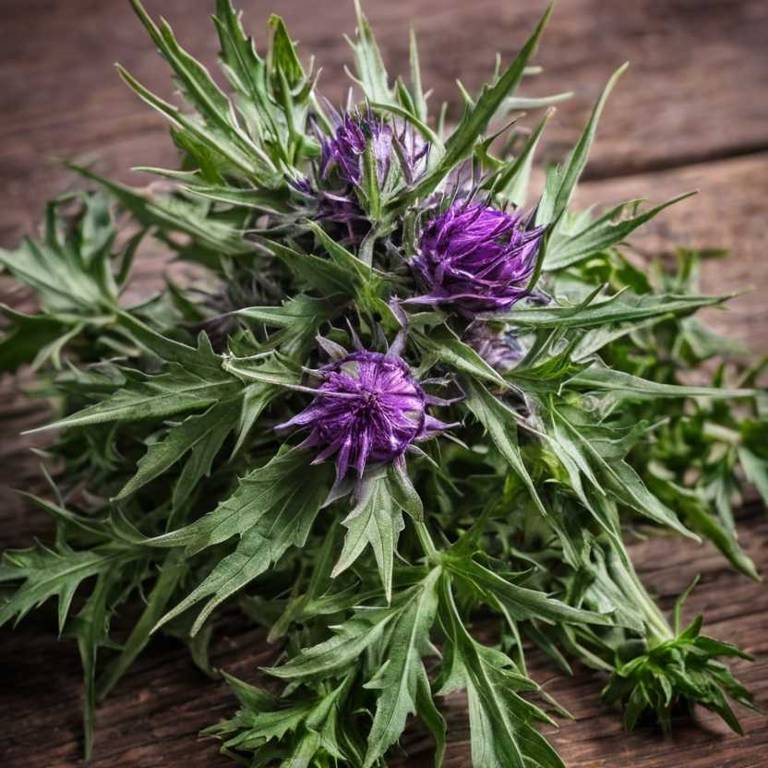Thistle (Silybum marianum)
Thistle (Silybum marianum) is a member of the Asteraceae family, native to Mediterranean Region, Southern Europe, and Middle East. Traditionally, its leaves, fruits, and seeds have been used for decoctions, infusions, and powders.
This herb is particularly valued for its anti-inflammatory, bitter, and tonic actions, and has a long history of use in european herbal medicine, mediterranean herbal traditions, and ayurvedic medicine.

Quick Facts / Key Information
| Common Name | Thistle |
|---|---|
| Scientific Name | Silybum marianum |
| Plant Family | Asteraceae |
| Genus | Silybum |
| Species | marianum |
| Native Range | Mediterranean Region, Southern Europe, Middle East |
| Plant Parts Used | Leaves, Fruits, Seeds |
| Primary Medicinal Actions | Anti-Inflammatory, Bitter, Tonic |
| Primary Traditional Systems | European Herbal Medicine, Mediterranean Herbal Traditions, Ayurvedic Medicine |
| Historical Preparation Methods | Decoction, Infusion, Powder |
Botanical Identity
- Scientific Name
- Silybum marianum
- Common Name
- Thistle
- Synonyms / Alternative Names
- Milk Thistle, Milk Thistle, Silybum
- Plant Family
- Asteraceae
- Genus
- Silybum
Botanical Description
- Growth Habit
- Perennial herbaceous plant.
- Height
- It typically grows to a height of 1 to 1.5 meters.
- Leaves
- Silybum marianum has broadly ovate leaves with a dark green upper surface and a lighter green lower surface, featuring white veins and a prominent marginal spine row.
- Flowers
- Radially symmetric flowers with purple to violet petals arranged in a dense head, each flower having five petals with white veins and a central disc of yellow tubular flowers.
- Stems
- Cylindrical, ribbed, spiny, glabrous, upright, branched, with persistent basal leaves.
Traditional Uses / Historical Use
Traditional Systems
- European Herbal Medicine
- Mediterranean Herbal Traditions
- Ayurvedic Medicine
Historical Preparation Methods
- Decoction
- Infusion
- Powder
- Poultice
Medicinal Actions
- Anti-inflammatory
- Traditionally described as a mild anti-inflammatory, in tissue-soothing contexts.
- Bitter
- Historically regarded as a moderate bitter, for digestion-related formulations.
- Tonic
- In herbal literature, noted as a cooling tonic, in whole-system applications.
- Antispasmodic
- Commonly referenced as a calming antispasmodic, for cramp-focused discussions.
Active Compounds
- Flavonoid
- A group of naturally occurring compounds commonly present in many flowering plants.
- Coumarin
- A class of aromatic organic compounds found in many plant species.
- Phenolic Acid
- Organic acids commonly occurring as part of plant secondary metabolism.
- Glycoside
- Plant-produced compounds commonly stored in inactive glycosylated forms.
Modern Research Overview
Contemporary research on this plant includes areas such as chemical analysis, laboratory-based studies, and observational research. Detailed summaries of published findings are not included at this stage and will be added during future content updates.
Safety & Contraindications
- General Precautions
- Some general precautions have been associated with the use of this herb.
- Contraindications
- Certain contraindications have been reported in relation to the use of this herb.
- Allergies
- Allergic reactions associated with this herb have not been well documented.
- Drug Interactions
- Potential interactions with prescription medications have been reported in available sources.
- Toxicity
- This herb has been associated with toxic effects under certain conditions.
- Pregnancy & Breastfeeding
- There is insufficient evidence to determine the safety of this herb during pregnancy or breastfeeding.
Preparation & Usage Methods
- Infusion
- Plant material is steeped in hot water to extract water-soluble compounds.
- Decoction
- A preparation method involving prolonged boiling of roots, bark, or dense plant material.
- Poultice
- Plant parts are crushed or moistened and placed directly on the body.
- Extract
- Plant compounds are extracted using water, glycerin, or other solvents.
- Tincture
- Plant material is macerated in alcohol to create a concentrated liquid extract.
Growing, Harvesting & Storage
Growing / Cultivation
- Soil
- Prefers loamy soil with well-drained conditions. Typically grows best in high organic matter soils.
- Sunlight
- Thrives in full sun. Tolerates full sun to partial shade.
- Watering
- Prefers well-balanced moisture levels. Tolerates occasional drought.
Medical Disclaimer
The information provided on this page is for educational and informational purposes only. It is not intended to diagnose, treat, cure, or prevent any medical condition. Always consult a qualified healthcare professional before using any herb for medicinal purposes.